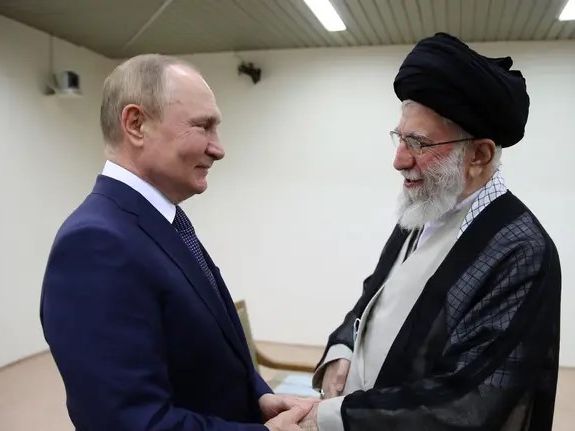Tehran Asks Moscow For Help To Suppress Protests - Sources

The Islamic Republic has asked Russia for help to quell the popular uprising by supplying anti-riot equipment and training, Iran International has learned.

The Islamic Republic has asked Russia for help to quell the popular uprising by supplying anti-riot equipment and training, Iran International has learned.
The Iranian regime has asked Moscow to dispatch advisors as it is preparing for a long-term confrontation with protesters and concerned about its limited resources both in manpower and equipment.
Secret files recently obtained by hackers and shared with Iran International also shows that Tehran is relying on information from Moscow to assess its own internal situation. There are references in the documents that Russia is eavesdropping on Western communications to give Tehran assessments about the nature and strength of the protest movement.
The new information about Tehran asking Moscow’s help confirmed remarks late in October by the White House that Russia may be advising Tehran on optimal methods to suppress the ongoing protests.
White House press secretary Karine Jean-Pierre said during a joint press briefing with Coordinator for Strategic Communications at the National Security Council in the White House John Kirby that Moscow may be helping the Islamic Republic, drawing on its own experience in suppressing demonstrations.
"The evidence that Iran is helping Russia rage its war against Ukraine is clear and it is public. Iran and Russia are growing closer the more isolated they become," Jean-Pierre said. "Our message to Iran is very, very clear: Stop killing your people and stop sending weapons to Russia to kill Ukrainians."

Kirby said that the White House is certain about Russia’s help in the crackdown on protesters, adding that it is not an allegation but a fact. “We know they may be considering some sort of support to Iran’s ability to crack down on protesters. And sadly, Russia has experience at doing that,” he said.
Kirby called it “just yet another example of Russia and Iran now working together to violate the — not only the human rights and civil rights of people in Iran but, of course, put in further danger the lives of Ukrainians.”
The growing outcry against Iran’s brutal crackdown on anti-government protests ignited by the beating to death of Mahsa Amini that has led to about 470 other killings has now been magnified by the Islamic Republic’s tilt toward Russia and arms support for its invasion of Ukraine.
It has already caused a policy shift in Washington as the Biden administration has said that the revival of the 2015 Joint Comprehensive Plan of Action (JCPOA) is not a priority at present and that the US focus is on the protests in Iran. US Special Envoy for Iran Robert Malley said earlier in the week that President Joe Biden is prepared for a military option to prevent Iran from acquiring a nuclear weapon in case sanctions and diplomacy fail.
A senior Revolutionary Guard commander Saturday told Iran International that the IRGC's chief commanders have called up 1,000 retired members to help quell the popular uprising as they don't have enough forces, but only 300 accepted to return to service and crack down on protests.
Earlier in the week, an audio file obtained by the hacktivist group, Black Reward, revealed concerns among Iranian officials about their worn-out security forces, media failures and labor strikes.
Black Reward found access to Fars News Agency’s data servers in recent days providing Iran International with an audio tape of a meeting between a Revolutionary Guard general and a group of media managers or representatives from outfits affiliated with the IRGC.
About 18,000 people have been arrested since the beginning of the protests, and some death sentences have already been issued for the protesters, though none have been carried out. According to Norway-based HRANA on December 2, 469 protestors and 61 members of the security forces have been killed in protests since September 17.